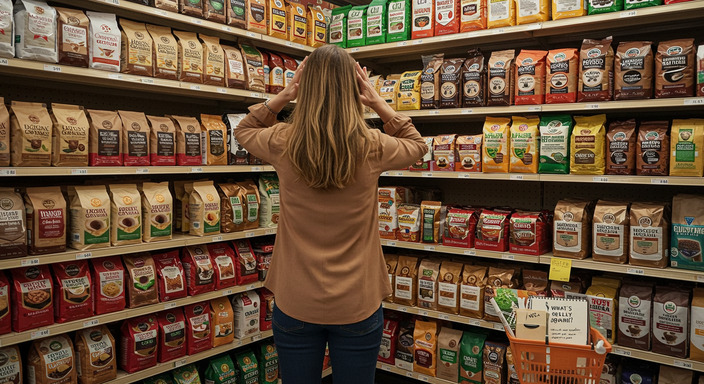
Is All Arabica Coffee Organic? Exploring the Truth

Table of Contents
ToggleWhat is Arabica Coffee?
Origins and Characteristics of Arabica Beans
Arabica coffee, scientifically known as Coffea arabica, is one of the most beloved coffee varieties in the world. Originating from the highlands of Ethiopia, this bean has a rich history that dates back centuries. Arabica plants thrive in higher altitudes, typically between 2,000 and 6,000 feet, where the cooler climate and fertile soil contribute to their unique flavor profile.
Arabica beans are known for their smooth, complex taste, often featuring notes of fruit, berries, chocolate, and even floral undertones. They contain less caffeine compared to other coffee types, making them a gentler option for those sensitive to caffeine. The beans are also slightly larger and more oval-shaped, with a distinctive curved crease.
Why Arabica is Favored Over Other Coffee Types
Arabica coffee is often considered the gold standard in the coffee world, and for good reason. Its superior flavor and lower acidity make it a favorite among coffee enthusiasts and casual drinkers alike. Unlike its counterpart, Robusta, which is often described as harsher and more bitter, Arabica offers a smoother, more refined experience.
Here are a few reasons why Arabica stands out:
- Flavor Complexity: Arabica beans are celebrated for their nuanced and diverse flavor profiles, which can vary depending on the region where they are grown.
- Lower Caffeine Content: With about half the caffeine of Robusta beans, Arabica is a better choice for those looking to reduce their caffeine intake.
- Health Benefits: Arabica coffee is rich in antioxidants and has been linked to various health benefits, including improved heart health and reduced inflammation.
- Sustainability: Many Arabica coffee farms prioritize sustainable farming practices, making it a more eco-conscious choice for environmentally aware consumers.
Whether you’re a seasoned coffee drinker or just starting to explore the world of coffee, Arabica offers a delightful and sustainable option that aligns with healthier and more ethical lifestyle choices.
Understanding Organic Coffee
What is Organic Coffee?
Organic coffee is more than just a label—it’s a commitment to sustainable and ethical farming practices. Unlike conventional coffee, organic coffee is grown without synthetic pesticides, herbicides, or chemical fertilizers. Instead, farmers rely on natural methods like composting, crop rotation, and shade-grown techniques to nurture the soil and protect the environment.
To be certified organic, coffee must meet strict standards set by organizations like the USDA or international equivalents. These standards ensure that every step of the process, from planting to packaging, adheres to eco-friendly practices. This certification isn’t just a stamp—it’s a promise of quality and sustainability.
Benefits of Organic Farming for the Environment
Organic coffee farming isn’t just good for your cup—it’s a gift to the planet. Here’s how it makes a difference:
- Protects Soil Health: Organic farming uses natural methods like composting and mulching, which enrich the soil and prevent erosion. Healthy soil means healthier crops and a thriving ecosystem.
- Supports Biodiversity: Shade-grown organic coffee farms provide habitats for birds, insects, and other wildlife. This helps maintain balance in local ecosystems and promotes biodiversity.
- Reduces Water Pollution: Without harmful chemicals leaching into waterways, organic farming keeps rivers and lakes clean, safeguarding aquatic life and communities that depend on these water sources.
- Combats Climate Change: Organic practices often include planting trees and using methods that absorb more carbon dioxide, helping to reduce greenhouse gas emissions.
By choosing organic coffee, you’re not just enjoying a cleaner, healthier brew—you’re supporting a system that respects the Earth and its resources. It’s a small choice with a big impact.
Is All Arabica Coffee Organic?
Arabica coffee is often celebrated for its smooth flavor and aromatic qualities, but not all Arabica coffee is organic. While Arabica beans are grown in many regions around the world, their organic status depends on how they are cultivated and processed. Understanding this distinction is crucial for eco-conscious consumers who aim to make ethical and sustainable choices.
Why Not All Arabica Is Organic
Arabica coffee may not be organic for several reasons. Many coffee farms use synthetic pesticides, herbicides, and fertilizers to increase yield and protect crops from pests. Additionally, non-organic farming practices often rely on conventional methods that can harm the environment, such as soil degradation and water contamination. Without certification or adherence to organic standards, even high-quality Arabica beans cannot be labeled as organic.
Factors That Determine Organic Status
To be considered organic, coffee must meet specific criteria. Here are the key factors that determine organic status:
- No synthetic chemicals: Organic coffee is grown without synthetic pesticides, herbicides, or fertilizers. Instead, natural alternatives like compost and organic pest control are used.
- Sustainable farming practices: Organic farms prioritize soil health, biodiversity, and water conservation. Techniques like shade-growing and crop rotation are often employed.
- Certification: Coffee must be certified by a recognized organization, such as the USDA Organic or Fair Trade, to verify it meets organic standards.
- Processing methods: Organic coffee must be processed without chemical additives or synthetic agents, ensuring the beans remain uncontaminated.
Choosing organic Arabica coffee not only supports healthier ecosystems but also promotes fair labor practices and better working conditions for farmers. By understanding these factors, you can make informed decisions that align with your values.
The Benefits of Choosing Organic Arabica Coffee
Health Advantages of Organic Coffee
When you choose organic Arabica coffee, you’re not just indulging in a rich, flavorful cup—you’re also making a healthier choice for your body. Organic coffee is grown without the use of synthetic pesticides, herbicides, or chemical fertilizers, which means fewer harmful residues end up in your brew. This reduces your exposure to potentially toxic substances, allowing you to enjoy your coffee with peace of mind.
Additionally, organic farming practices often result in coffee beans that are richer in antioxidants. These compounds help combat oxidative stress in the body, supporting overall health. Studies suggest that organic coffee may also have a more balanced flavor profile, as the beans are allowed to mature naturally without chemical interference.
Supporting Sustainable and Ethical Farming Practices
Choosing organic Arabica coffee isn’t just about personal health—it’s about making a positive impact on the planet and the people who grow your coffee. Organic farming methods prioritize sustainability by:
- Protecting soil health: Organic practices avoid synthetic chemicals, preserving the soil’s natural fertility and reducing erosion.
- Conserving water: Organic farms often use water more efficiently, minimizing waste and protecting local water sources.
- Promoting biodiversity: By avoiding harmful pesticides, organic farms create a healthier environment for plants, animals, and insects.
Beyond environmental benefits, organic coffee farming often supports fair labor practices. Many organic certifications require fair wages and safe working conditions for farmers, ensuring that your purchase contributes to ethical and equitable treatment of workers. By choosing organic, you’re not just enjoying a better cup of coffee—you’re helping to create a more sustainable and just world.
How to Identify Truly Organic Arabica Coffee
Reading Labels and Certifications
When shopping for organic Arabica coffee, the first step is to carefully read the labels. Look for certifications that guarantee the coffee meets organic standards. The most trusted certification in the U.S. is the USDA Organic seal, which ensures the coffee is grown without synthetic pesticides, herbicides, or fertilizers. Other reputable certifications include:
- Fair Trade Certified: Ensures ethical labor practices and fair wages for farmers.
- Rainforest Alliance Certified: Focuses on sustainable farming and environmental conservation.
- Bird Friendly Certified: Promotes shade-grown coffee that protects bird habitats.
Be cautious of terms like “natural” or “eco-friendly,” as they are not regulated and do not guarantee organic practices. Always verify the presence of a recognized certification.
Trusted Brands and Eco-Friendly Options
Choosing a trusted brand can simplify your search for truly organic Arabica coffee. Many companies prioritize sustainability and transparency in their sourcing practices. Here are a few well-regarded options:
- Equal Exchange: Known for its commitment to fair trade and organic farming.
- Lavazza: Offers a range of organic and sustainable coffee options.
- Counter Culture Coffee: Focuses on direct trade and environmentally friendly practices.
Additionally, consider supporting local roasters who source their beans from organic farms. Many small-scale roasters are passionate about sustainability and can provide detailed information about their sourcing practices. By choosing eco-friendly brands, you not only enjoy a healthier cup of coffee but also contribute to a more sustainable and ethical coffee industry.
Making Eco-Conscious Coffee Choices
Why Sustainability Matters in Coffee Production
Coffee is one of the most widely consumed beverages in the world, but its production can have significant environmental and social impacts. Unsustainable farming practices, such as deforestation, excessive water use, and reliance on chemical pesticides, can harm ecosystems and reduce biodiversity. Sustainable coffee production, on the other hand, prioritizes methods that protect the environment, support fair labor practices, and ensure long-term viability for farmers.
When you choose sustainably grown coffee, you’re supporting:
- Environmental health: Organic farming avoids synthetic chemicals, promoting soil fertility and reducing pollution.
- Biodiversity: Shade-grown coffee preserves habitats for birds and other wildlife.
- Farmers’ livelihoods: Fair Trade and other certifications ensure fair wages and better working conditions.
Tips for Reducing Your Coffee Footprint
Making eco-conscious coffee choices doesn’t have to be complicated. Here are some simple yet impactful steps you can take:
- Choose organic coffee: Look for certifications like USDA Organic, which guarantee the coffee is grown without synthetic pesticides or fertilizers.
- Support Fair Trade: Opt for Fair Trade-certified products to ensure farmers receive fair compensation.
- Buy in bulk: Purchasing larger quantities reduces packaging waste and lowers the carbon footprint of shipping.
- Brew mindfully: Use energy-efficient coffee makers, avoid single-use pods, and compost coffee grounds to minimize waste.
- Reuse and recycle: Invest in reusable coffee cups, filters, and containers to cut down on disposable items.
Every small step you take contributes to a healthier planet and a more sustainable coffee industry. By making informed choices, you can enjoy your daily cup of coffee while supporting ethical and environmentally friendly practices.
Conclusion: Brewing a Better Future
Recap of Key Takeaways
Throughout this exploration of organic Arabica coffee, we’ve uncovered essential insights to guide your coffee choices. Here’s a quick recap:
- Organic certification ensures coffee is grown without synthetic pesticides or fertilizers, protecting both your health and the environment.
- Not all Arabica coffee is organic—labeling matters. Look for certifications like USDA Organic or Fair Trade to guarantee authenticity.
- Choosing organic coffee supports sustainable farming practices, biodiversity, and the well-being of farmers and their communities.
Encouragement to Choose Organic and Sustainable Coffee
Every cup of coffee you drink is an opportunity to make a positive impact. By opting for organic and sustainably sourced coffee, you’re not just savoring a richer, healthier brew—you’re contributing to a more sustainable future. Here’s why it matters:
- Healthier for you: Organic coffee is free from harmful chemicals, offering a cleaner, more natural flavor and reducing your exposure to toxins.
- Better for the planet: Organic farming practices protect soil health, conserve water, and promote biodiversity, helping to combat climate change.
- Fairer for farmers: Supporting organic and Fair Trade coffee ensures farmers receive fair wages and work in safe, ethical conditions.
Making the Switch
Transitioning to organic coffee doesn’t have to be overwhelming. Start small—choose one organic product to try, and gradually make it a habit. Remember, every purchase is a vote for the kind of world you want to live in. By supporting organic and sustainable coffee, you’re helping to brew a better future—one cup at a time.
FAQs
Is all Arabica coffee organic? No, not all Arabica coffee is organic. Only coffee labeled with organic certifications meets the strict standards for organic farming practices. Why is organic coffee more expensive? Organic coffee often costs more due to the labor-intensive farming methods, certification fees, and fair wages paid to farmers. However, the benefits to health, the environment, and communities make it a worthwhile investment. How can I ensure my coffee is truly organic? Look for trusted certifications like USDA Organic, Fair Trade, or Rainforest Alliance on the packaging. These labels guarantee the coffee meets specific organic and ethical standards.
is a writer and editor at Coffee With Finance, blending her love for coffee, personal finance, and visual storytelling. She crafts engaging articles, curates site images, and shares brewing tips, bean origins, and practical money advice. Anna believes that managing finances, like making great coffee, should be intentional and rewarding — bringing clarity, warmth, and beauty to every story she tells.




























Post Comment